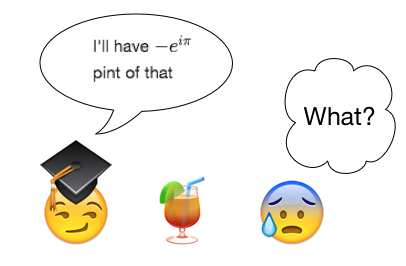A Mathematician Went To A Bar

A mathematician went to a bar and ordered, "I'll have − e i π pint of beer."
How much (in pints) did he order?
The answer is 1.
This section requires Javascript.
You are seeing this because something didn't load right. We suggest you, (a) try
refreshing the page, (b) enabling javascript if it is disabled on your browser and,
finally, (c)
loading the
non-javascript version of this page
. We're sorry about the hassle.
3 solutions
I don't think you even need the math to solve it.. The word "pint" says that the answer is 1 !!
According to Euler's identity e i π + 1 = 0 .
Euler's identity is a special case of Euler's formula from complex analysis, which states that for any real number x ,
e i x = cos x + i sin x where the inputs of the trigonometric functions sine and cosine are given in radians.
In particular, when x = π , or one half-turn ( 1 8 0 ° ) around a circle:
e i π = cos π + i sin π . Since
cos π = − 1 , and
sin π = 0 , it follows that
e i π = − 1 + 0 i , which yields Euler's identity:
e i π + 1 = 0 .
Well
− e i π = − ( − 1 ) ∴ 1 .
FIN!!
Let z = cos ( x ) + i sin ( x ) , then
d x d z = − sin ( x ) + i cos ( x ) = i 2 sin ( x ) + i cos ( x ) = i ( cos ( x ) + i sin ( x ) ) = i ( z ) .
z d z = i d x .
Integrating both sides,
ln ( z ) = i x + C
e ln ( z ) = e i x + C
z = e i x + C
e i x + C = cos ( x ) + i sin ( x ) .
Substituting x = 0 ,
e i × 0 + C = 1
e 0 + C = e 0
∴ C = 0
We get the Euler's equation,
e i x = cos ( x ) + i sin ( x )
When x = π ,
e i π = cos ( π ) + i sin ( π ) = − 1
∴ − e i π = − ( − 1 ) = 1 .